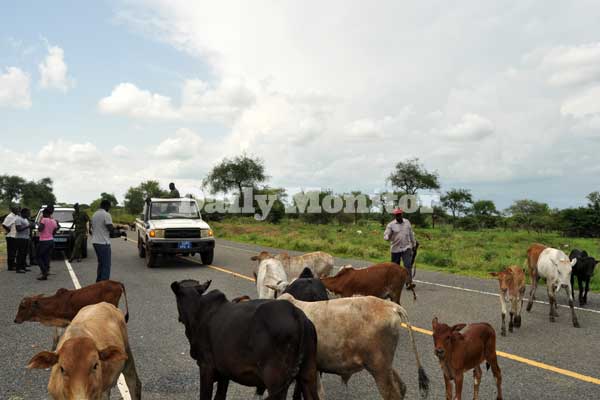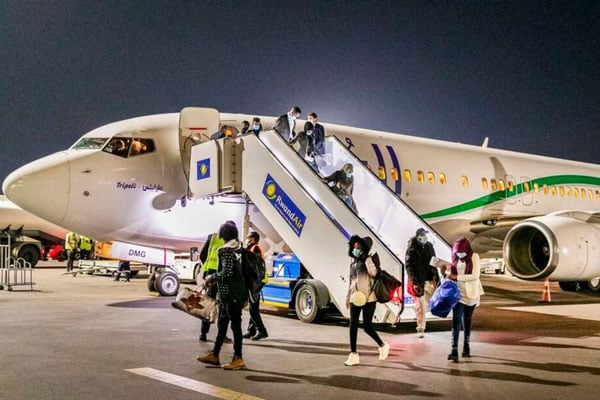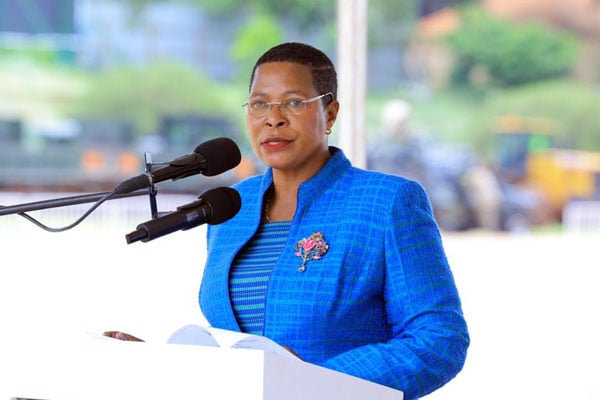Prime
Balaalo defy Museveni, sneak cattle back into Acholi region

Prime Minister Robinah Nabbanja (left) talks to Minister of State for Internal Affairs Gen David Muhoozi (centre) and State minister for Labour, Employment and Industrial Relations Col (rtd) Charles Okello Engola during the launch of the Balaalo eviction process in November 2021. President Museveni appointed Gen Muhoozi, Col (rtd) Engola and Col Bright Rwamirama to implement the eviction of the Balaalo from Northern Uganda in 2021. photo/ TOBBIAS JOLLY OWINY
What you need to know:
- Locals are hiring out their land to the herdsmen.
Authorities across Acholi Sub-region are facing an uphill task of evicting Balaalo (herdsmen) and their animals after they discovered that many of them did not leave the region as earlier instructed.
It was also discovered that some of those who had earlier been evicted following a presidential directive sneaked back into the region.
On November 2, President Museveni issued a two-month ultimatum to the Balaalo herdsmen to vacate northern Uganda or face forcible eviction and prosecution.
However, leaders in the sub-region, who spoke to Daily Monitor, said thousands of head of cattle belonging to the Balaalo are spread out across the region and attempts to evict them have been futile.
Mr Milton Odongo, the Pader Resident District Commissioner (RDC), blamed the return of the Balaalo on the locals who he said are hiring out their land to the herdsmen.
“The Balaalo who are coming into the district are being invited by the local community (landowners). There are people who say they have their land and want to hire it to the Balaalo. They sneak these herdsmen into the district,” Mr Odongo said.
He added: “Poverty will make it very difficult for us to execute certain directives. Even those (Balaalo) we evicted, some come back because locals ask them to come.”
Whereas there is a directive in place that details the conditions to allow the herdsmen to stay in the district, Mr Odongo said the Balaalo are not adhering to the conditions.
“In the directive, only verified herdsmen with proof of land ownership, fencing and a water point would be allowed to operate but they don’t have these requirements in place and have declined to provide them,” he said.
“I am organising a community meeting in those areas where the herdsmen have animals and we do community sensitisation. I want to engage the landowners, they should not bring us problems by inviting these people into the district,” he added.
A similar problem is occurring in Gulu District. Leaders in the district say Awach, Palaro, Owalo, Patiko and Paibona sub-counties have experienced an increase in the number of herdsmen. They, however, did not give the number of Balaalo in the area.
Mr Francis Wokorach, the Palaro Sub-county chairperson, said new groups of herdsmen are trickling into the sub-county every week and that they have intervened in three separate incidents where locals attempted to beat up the herdsmen.
“In my area, they are too many now. Others don’t have land for their animals and are moving from one village to the next with their animals. They have increased in number,” Mr Wokorach said.
He added that when they tried to evict the herdsmen, the locals got angry.
“We failed to get rid of them. We became enemies of society when we were tried to evict them. The herdsmen continue to buy land or hired it from the locals. We have instead come up with bylaws so that if your animals cross into the land that is not yours and destroys things, you are fined.”
In Amuru District, the locals have accused the Balaalo of stealing their livestock.
Authorities in the district said more than 7,000 head of cattle are grazing in the villages of Tee-okutu, Bombay, Orego in Lakang and Kololo parishes as well as Orego Village in Pailyec Parish.
Areas occupied by the herdsmen in the district include Okidi, Atiak and Palukere in Atiak Sub-County, and Bombay, Kololo, and Bana, among others in Opara Sub-county.
Ms Joan Apio, the deputy RDC of Amuru, said politicians are frustrating their efforts to evict the Balaalo from the district.
“The leaders of these sub-counties are misleading the herdsmen. In one incident, they duped a herdsman and gave him land belonging to the community and up to now we are yet to settle the matter,” Ms Apio said.
She added that sub-county chairpersons and councillors are convincing with the herdsmen to bring them into the district.
Last week on Wednesday, leaders in Lakang Sub-county in Amuru District led by Kilak South MP Gilbert Olanya intercepted five trucks loaded with animals that had arrived in the area.
“The community told us that the sub-county authorities had ordered that the animals be put into their land even without their consent. And the land owners were not aware of what was going on,” Mr Olanya said.
He added: “The problem is greed for money, the Balaalo we keep intercepting show us proof of deals between them and the local leaders who hire them land without letting the owners know. These animals are harming our farming communities, they destroy crops, tree plantations, etc.”
Mr Ambrose Olaa, the Acholi chiefdom premier, also said there has been a severe lack of will to enforce the presidential directive to evict the Balaalo.
“The momentum that existed immediately after the directive died down and it allowed many more Balaalo to start using different tactics to get back here. Where the will was strong for instance in Palabek, they were evicted and you don’t find them there,” Mr Olaa said.
In Lamwo District, Mr Sebastian Oswind Oguti, the deputy RDC, said they succeeded in ridding the district of the Balaalo due to the joint effort of the district security committee and the cultural institutions.
“Without the backup of the cultural institutions, especially in the Apyeta area, we wouldn’t have succeeded, and right now we don’t have records of any pastoralists in the district. Those who have tried to sneak back, we repelled them because they have no place here,” Oguti said.
He added that sensitising the local communities on the values and uses of land was key in helping them to appreciate the advantage of using land for farming instead of hiring or selling the land to the pastoralists.
Background
On November 2, 2021, President Museveni issued a two-month ultimatum to the Balaalo herdsmen to vacate northern Uganda or face forcible eviction and prosecution.
In the letter addressed to Prime Minister Robinah Nabbanja, Mr Museveni described the herdsmen as illegal migrants whose animals remain a persistent problem to the farming communities in the north, specifically the Acholi region.
To implement this directive, Mr Museveni said he had appointed a three-man committee comprising Gen David Muhoozi, Col (rtd) Charles Okello Engola and Col Bright Rwamirama.
In the letter, Mr Museveni stated that the herdsmen did not follow the procedures involved to move their animals to the north noting that their illegal activities were tainting the image of the National Resistance Movement (NRM) .
This was the second directive Mr Museveni issued regarding the matter. On October 24, 2017, President Museveni had directed the army and the Agriculture ministry to evict the Balaalo from northern Uganda.




